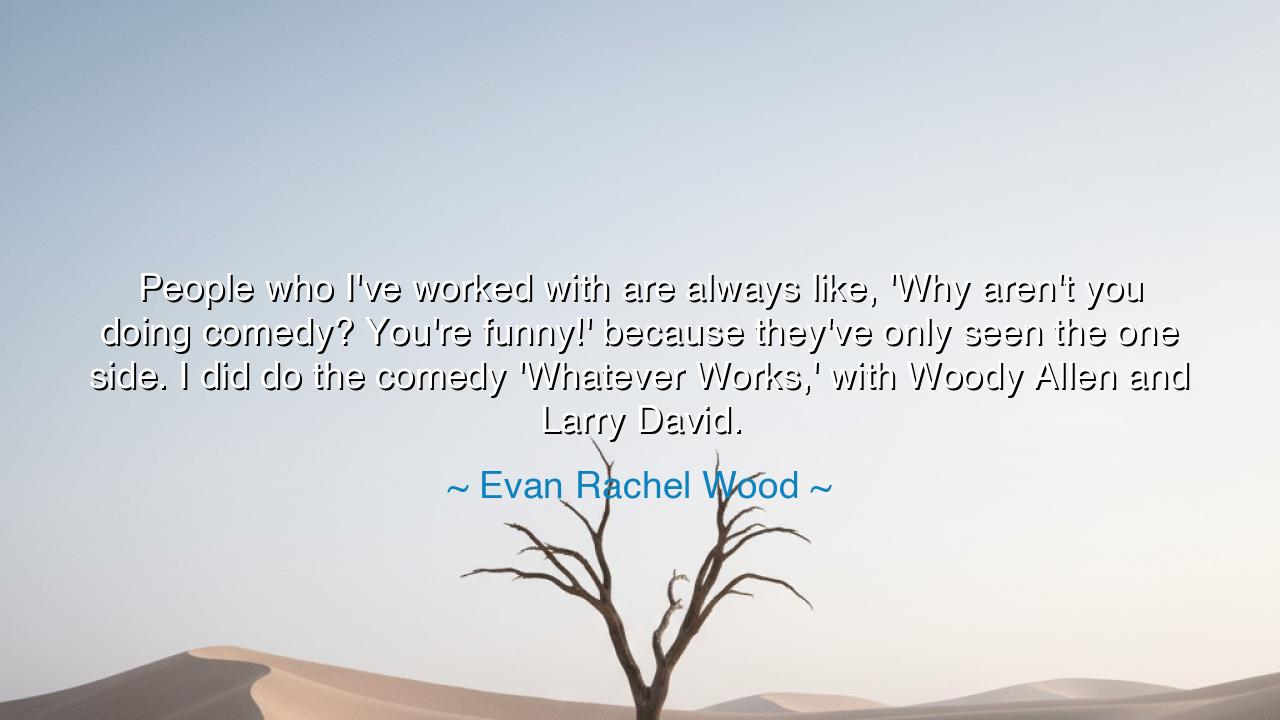
People who I've worked with are always like, 'Why aren't you
People who I've worked with are always like, 'Why aren't you doing comedy? You're funny!' because they've only seen the one side. I did do the comedy 'Whatever Works,' with Woody Allen and Larry David.






Hear now, O children of artistry and becoming, the words of Evan Rachel Wood, who spoke with quiet truth: “People who I’ve worked with are always like, ‘Why aren’t you doing comedy? You’re funny!’ because they’ve only seen the one side. I did do the comedy ‘Whatever Works,’ with Woody Allen and Larry David.” Though she speaks softly, her words resound with the eternal struggle of the artist—to be seen in their fullness, to be known not by one mask, but by the many faces of the soul. For her reflection is not only about acting, but about identity, and the human yearning to be recognized beyond the limits others place upon us.
In her lament, Wood reveals the pain and paradox of perception. The world, she tells us, sees only one side—the side that is familiar, marketable, or convenient. Her gifts as a dramatic actor, honed through intense and emotional performances, have made her known as a vessel of gravity and depth. Yet within her also dwells lightness, wit, and the power to create laughter. The tragedy, then, is not that she cannot be funny, but that those around her cannot imagine it. They are bound by the illusion of their own expectations. How often, in life and art, do we imprison others—and ourselves—within the walls of what we already believe?
Her mention of the film Whatever Works, directed by Woody Allen and starring the comic sage Larry David, is a glimpse into her other side—the one few acknowledge. In this film, she stepped into a world of irony, satire, and absurd humor, proving that even those known for intensity can also dance in delight. Her experience mirrors the story of countless artists who defied the world’s attempts to define them. Consider Charlie Chaplin, whose early performances were dismissed as clownish, yet who later became a voice of profound social truth in The Great Dictator. So too did Wood remind us that the artist’s essence is not one note but a symphony—each tone essential to the song of the soul.
There is also humility in her words, for she does not cry out in bitterness, but speaks as one who understands the duality of human nature. “They’ve only seen one side,” she says—not with anger, but with awareness. In this acknowledgment lies wisdom: that to be misunderstood is often the cost of depth. The world, eager for simplicity, resists complexity. But the artist, like the philosopher, must dwell in both shadow and light, joy and sorrow, seriousness and humor. True creativity demands that one contain multitudes. The one who can play both tragedy and comedy understands life more fully than the one who clings to only one truth.
This, then, is the heart of Evan Rachel Wood’s insight: that laughter and sorrow spring from the same root. To be truly “funny,” as her colleagues call her, is not to escape pain—it is to transmute it. Comedy, when born from intelligence and empathy, requires the same courage as drama. The performer who can make others laugh has faced the world’s absurdity and chosen joy in spite of it. Thus, her words become not a protest, but a revelation: the artist who feels deeply can also laugh deeply, for both are expressions of the same human fullness.
Consider the tale of Mel Brooks, who survived persecution and war, yet built a career making the world laugh at the very darkness that sought to destroy him. Like Wood, he knew that humor was not weakness, but wisdom—a way of confronting pain with defiance. The ancients understood this too: in the festivals of Dionysus, comedy and tragedy were born together, two faces of one god. To laugh is to live, to weep is to remember that we are alive—and both require the same divine fire. So when Wood speaks of her unseen comedic side, she is not speaking only of her craft, but of the sacred truth that wholeness demands contradiction.
Therefore, O children of art and identity, learn from her words this lesson: never allow others to define your limits. The world will see only what it wishes to see, but your spirit is larger than their imagination. Do not fear to surprise, to transform, to reveal another face of your being. You are not one thing—you are many, and each is holy. Embrace your humor as you embrace your sorrow; let your laughter echo even in your moments of pain. For to live as a full being, as Evan Rachel Wood teaches, is to show the world not just the one side it expects, but the endless, wondrous sides it never dreamed you had.
And so, walk forth in courage. Let your life be your greatest performance—sometimes serious, sometimes light, always true. For within you, as within every artist, dwells the same divine contradiction that makes humanity beautiful: the power to make others weep, and the grace to make them laugh again.






AAdministratorAdministrator
Welcome, honored guests. Please leave a comment, we will respond soon